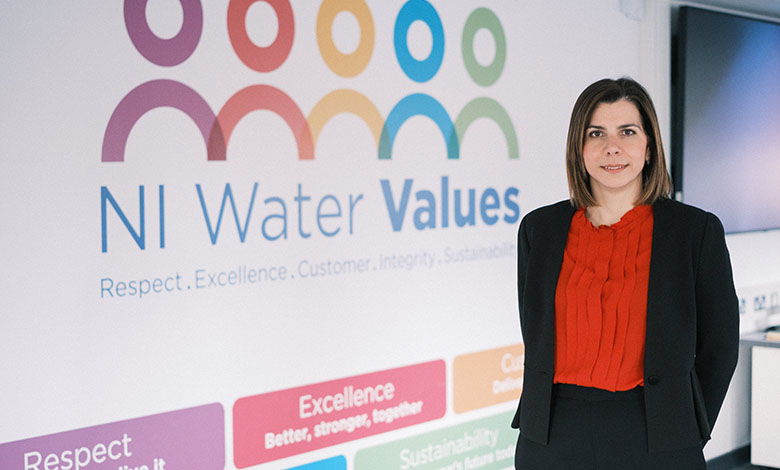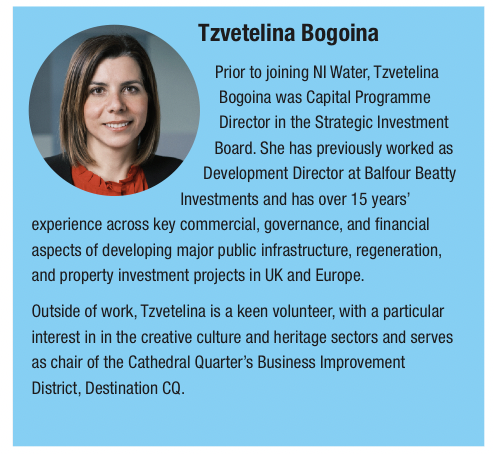Delivering what matters

Tzvetelina Bogoina, NI Water’s Director of Infrastructure Delivery, discusses the underpinning role water and wastewater infrastructure has in improving Northern Ireland’s economic and environmental future.
Bogoina explains that an insight into the future role NI Water can play in growing and protecting Northern Ireland’s economy can be garnered by looking back to the strides made by the organisation since its inception.
Originally established in 2007 as a regulated utility and a government company, NI Water has a single shareholder in the form of the Department for Infrastructure, from which, alongside commercial customers, it derives most of its income.
As Northern Ireland’s largest electricity user, and second largest landowner, it manages some £3 billion of assets and, since its origin, has closed an almost 50 per cent efficiency gap with comparable neighbouring water companies to less than 5 per cent in 2024.
Not only does NI Water pride itself on the efficient use of public money, as an organisation that pays interest on its government loans – as well as dividends – it is estimated that it has returned almost £1 billion pounds to the public purse via infrastructure investments since 2007.
Describing NI Water’s evolution into a highly efficient and purpose-driven organisation, the Director of Infrastructure Delivery insists it is testament to its leadership and staff, pointing to this as a major factor in her decision to take up the role six months ago.
“I have been inspired by the commitment and dedication that exists in NI Water, not just to doing the job, but to doing what is right and delivering what matters for Northern Ireland. The journey NI Water has been on is inspirational. There are not many organisations who deliver the complexity of infrastructure that we do, with the limited resources that we have.

“If we connect more load to an already overloaded system, we will simply see an increase in the levels of spills and pollution, that will flow into rivers, lakes, seas, or people’s homes.” Tzvetelina Bogoina, Director of Infrastructure Delivery, NI Water
“Even in times of recent financial constraint, we are constantly designing and innovating to meet the challenges of the future, such as the climate emergency, making it an exciting organisation to be a part of.”
Crisis point
While NI Water prides itself on being a forward-thinking organisation, it continues to operate in the context of a legacy of underfunding in Northern Ireland’s wastewater system, which Bogoina explains has now reached “crisis point”.
Concerns around underinvestment in Northern Ireland’s water and wastewater infrastructure have been long-standing. However, progress was made in 2021 when over a decade of investment neglect by central government was acknowledged in the New Decade, New Approach agreement to restore power sharing.
A pledge to “invest urgently” in wastewater infrastructure, which was at or nearing capacity, and therefore limiting economic and housing growth, was underpinned with the approval of NI Water’s regulated business plan for 2021-2027 (PC21). This confirmed the need for a £2.1 billion capital investment programme for the delivery of water and wastewater infrastructure adjusted to recognise the challenging efficiency target set by the regulator.
PC21
Bogoina explains that the PC21 investment pledge was not a silver bullet to the challenges posed by a legacy of underinvestment, but the first major milestone in plans to address and rectify underspend, over a series of successive investment periods.
She expresses significant concerns that budgetary pressures within the Department for Infrastructure could see the planned investment reduced.
“The PC21 award was significant because it was an external recognition of the need for investment in our infrastructure, particularly in relation to wastewater, and set us on a pathway to deliver a very important and ambitious programme.
“It is important to note that our PC21 submission was not a wish list, it is heavily regulated, and we started from a point of need, recognising the importance of being realistic in the investment we could achieve, and the work that we could deliver in the timeframe.
“NI Water fully recognised the challenges of previous underinvestment. PC21 is our plan to mitigate those risks, prioritising the areas of greatest need. Importantly, we pointed to our legacy of quality service delivery, in the most efficient manner, to emphasise that when we are properly equipped, we are at the forefront of world-class delivery.”
Outlining current challenges and their wider consequences, the Director of Infrastructure Delivery outlines: “The modelling that we do on our systems now tell us that many of our wastewater assets are at capacity, meaning that we are spilling into the environment more frequently than we should, and as a result development constraints are in place across Northern Ireland.
“We have come to the end of the line of maximising efficiencies or operating treatment works beyond their capacity, meaning that the connection of further load is not just challenging, but now impossible.
“The ramifications of this are huge when you consider how much of our society and economy is underpinned by our infrastructure. The absence of capacity means that we cannot connect new housing schemes, upgrade schools, improve hospitals, or expand industry.”

Environment
Such constraints in our wastewater system not only have economic ramifications but are also environmentally detrimental at a time when public concern about pollution is growing.
“The legacy of underinvestment in our wastewater system means that it is challenging to achieve the levels of performance currently set for Northern Ireland which remain below UK standards,” explains Bogoina.
“The PC21 investment was necessary to bring our assets up to standard because the current situation is that networks are undersized, meaning that storm water can overwhelm those networks and result in flooding or excessive levels of wastewater spilling over.
“If we connect more load to an already overloaded system, we will simply see an increase in the levels of spills and pollution, that will flow into rivers, lakes, seas, or people’s homes.”
In December 2023, the Department for Infrastructure, prior to the Executive returning, mooted the possibility that amidst financial pressures, it may have to cut the funding for the capital programme by up to 50 per cent, a figure described by Bogoina as a “nightmare scenario”.
Outlining the significance of this potential cut, Bogoina explains that the initial years of PC21 have been focused on priority schemes, but also around creating delivery frameworks, and building supply chains. Signals to contractors that funding to some of the planned works may now be in danger, will have detrimental consequences for jobs and skills in the local construction sector.
The launch of Phase 1 of the Sicily/Marguerite Park flood alleviation project in south Belfast, the completion of a major wastewater improvement project in Ards north, and upgrades of water treatment works in south Down and Fermanagh, are some of the examples listed by Bogoina of how NI Water has continued to successfully deliver schemes in the early phases of PC21.
However, the Director of Infrastructure Delivery believes that now is the time for a mindset change if delivery of crucial infrastructure is to continue.
“NI Water has repeatedly demonstrated its ability to provide world-leading water and wastewater services when properly resourced. We stand ready to deliver at pace. I think decision-makers must step away from viewing resources as going towards NI Water programmes, and instead see this funding for what it is: critical investment in assets which are owned by and provide services to the whole of Northern Ireland.
“We remain hopeful, particularly with the return of the Executive and Assembly, that the scaling back will not materialise, because if it does, Northern Ireland will be in a very bad place with regard to its wastewater treatment,” she adds.
Asked whether the current funding model for NI Water needs revised, Bogoina says: “Our ask has always been that we need a sustainable funding model that enables a multiyear programme that we can deliver. Delivery of large infrastructure on a yearly basis, and without financial certainty is very difficult, for NI Water, and for our delivery partners.
“One of the major challenges we face is that our infrastructure is largely unseen, and to some extent, it is taken for granted. We turn the tap, and we get top quality drinking water, or we flush the toilet and do not have to think about how it works. The invisibility of our infrastructure means that it has, in the past, been overlooked when resources are being allocated. However, our message is clear, failure to properly invest in our infrastructure will have long-term economic and environmental impacts.”
“Decision-makers must step away from viewing resources as going towards NI Water programmes, and instead see this funding for what it is: critical investment in assets which are owned by and provide services to the whole of Northern Ireland.”
Housing
Bogoina is quick to point out that NI Water has not been resting on their laurels when it comes to addressing constraints in the system. Recognising both the difficulties posed by the wastewater network, but also its role in enabling economic development, NI Water, working alongside the Environment Agency, have developed several temporary zero-detriment solutions to be deployed on the understanding that pledged investment was forthcoming.
In addition, NI Water has utilised pre-development enquiry (PDE) forms for developers to submit, to essentially work through potential solutions, before developers enter a lengthy planning process.
While additional costs for wastewater impact assessments have been the source of public frustration for some developers, Bogoina reiterates the reality – a system at capacity cannot accept any additional load, without the risk of greater levels of pollution.
Carbon neutral
Informing the solutions being delivered by NI Water is an acute understanding of the role the organisation has in helping to meet the overarching target of a net zero Northern Ireland by 2050. Describing NI Water’s Climate Change Strategy as “ambitious”, Bogoina explains that the organisation has gone “further and faster”, with its own target of net zero in energy use by 2030 and net zero emissions by 2040.
The ambitious climate change strategy is built upon NI Water’s The Power of Water report, a forward-looking analysis of how NI Water’s assets have the potential to become a catalyst for transforming Northern Ireland’s energy system.
Outlining work to date, the Director of Infrastructure Delivery says: “We are pursuing a wide range of initiatives, spanning from how we reduce our overall energy demand and ‘green’ that energy, through to how we can recover energy for our process emissions,” she explains.
“Equally, we are also looking at how we drive efficiencies in our processes by protecting our water sources. We recognise that if we can protect the clean water entering our system, then we can use less chemicals and energy to process that water. That feeds into our work around expanding our sustainable land management.
“As one of Northern Ireland’s largest landowners, we have made great strides in demonstrating our desire to be a key player in the region’s net zero journey. A key example is the completion of a £7 million solar farm at our Dunore Water Treatment Works (WTW) in south Antrim, which will save over £500,000 annually in energy costs for NI Water. As well as meeting the energy needs of the treatment works, the project will also enable the company to contribute spare capacity to the grid.”
Another example provided by Bogoina is a recent upgrade to Ballykelly Wastewater Treatment Works which has seen NI Water’s first battery energy storage system switched on.
In total, NI Water has identified over £400 million worth of investable projects on its net zero journey and divided these into three specific categories:
- projects which address their own energy use;
- projects which offer a shared benefit, such as the production of hydrogen to be used by transport providers; and
- projects in which NI Water act as support, for example, providing land to enable others on their green journey.
Bogoina explains: “We see our role as greater than that as a provider of water and wastewater services. We are all dependant on a healthy environment, and we have a responsibility to bring together stakeholders who can best protect it.”
The Director of Infrastructure Delivery believes that the purpose-driven nature of the organisation has been a critical part of the ability to attract talent. NI Water attracts high level apprentices and graduates through its programmes, developing skills for the future.
“We are seeing a trend of people coming into the business because they are excited about the opportunities that exist to deliver decarbonised solutions. They are excited by the scale of our infrastructure project delivery pipeline, but equally excited about their ability to make a meaningful contribution to protecting the environment.”
Concluding on what the future looks like for NI Water and critical infrastructure delivery in Northern Ireland in the coming years, Bogoina says: “My hope is that in a few years’ time we will be setting out our next business plan, safe in the knowledge that we have worked to address a legacy of underfunding through PC21 and set the foundations for an economically expanding, prosperous and net zero Northern Ireland.
“The reality is that PC21 has been agreed as the necessary expenditure needed to address capacity constraints across our system, and if that funding is not delivered, we face constraints not just on the system, but on the whole economy.
“NI Water has a proven track record of delivery, we have the people, the partnerships, and solutions to deliver what is needed for Northern Ireland. We now need the sustainable funding to enable us to get on with doing the job.”






